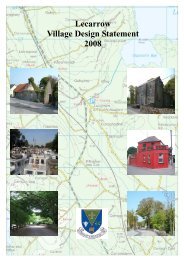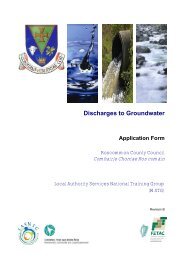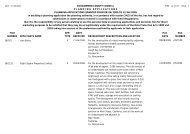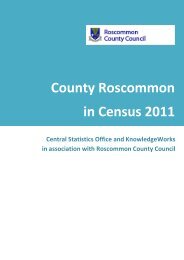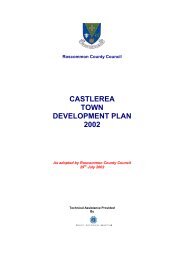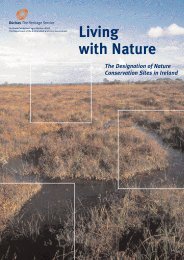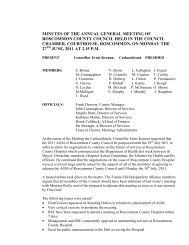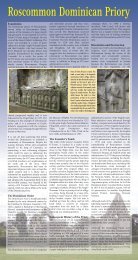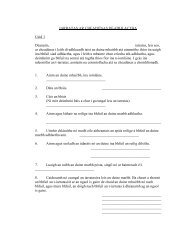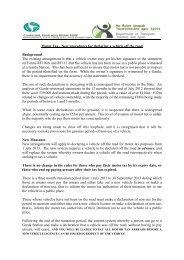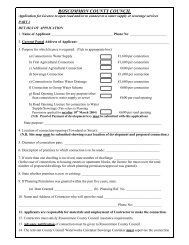boyle local area plan 2012 - 2018 - Roscommon County Council
boyle local area plan 2012 - 2018 - Roscommon County Council
boyle local area plan 2012 - 2018 - Roscommon County Council
You also want an ePaper? Increase the reach of your titles
YUMPU automatically turns print PDFs into web optimized ePapers that Google loves.
PART II: DEVELOPMENT STRATEGY FOR <strong>2012</strong> – <strong>2018</strong> & BEYOND Chapter 7: Economic Development & Employment<br />
7.2.6 Home-based Economic Activity<br />
Applications for small-scale home-based economic<br />
activity in rural <strong>area</strong>s, such as Boyle, where the<br />
occupants of an existing dwelling are employed at<br />
home will be positively considered where the proposal<br />
does not generate significant new traffic movements.<br />
Home-based businesses, which wish to expand beyond<br />
employing the household on site, may be required to<br />
locate in the village or to another <strong>area</strong> more suitable to<br />
the proposed use. The Planning Authority shall consider<br />
expansion to a full business within the rural <strong>area</strong> on a<br />
case-by-case basis.<br />
Home-based economic activity should if possible be<br />
sited either in converted existing farm buildings located<br />
adjacent to the main dwelling house or within the house<br />
where the use is compatible with and ancillary to the<br />
use of the dwelling as a home. Again, the Planning<br />
Authority shall judge each case on its own merits.<br />
The development strategy for rural enterprises in Boyle<br />
aims to:<br />
• Promote and support a wide range of new job<br />
creating opportunities, support the <strong>local</strong> economic<br />
base, and encourage diversification within<br />
employment and industry.<br />
• Develop the <strong>local</strong> economy such that it can sustain<br />
activities proportionate with the needs and scale of<br />
the expanding town.<br />
• Work with all strategic partners and <strong>local</strong><br />
stakeholders in the delivery of this goal and the<br />
enhancement of the <strong>local</strong> economy.<br />
7.3 ECONOMIC DEVELOPMENT &<br />
EMPLOYMENT STRATEGY<br />
In general, there are three different strategies to<br />
promote economic activity within towns and villages<br />
and these include; attracting new companies;<br />
retaining/growing existing companies; and starting<br />
new companies. Attracting new companies usually<br />
takes the form of attracting Foreign Direct Investment<br />
(FDI) by means of offering tax incentives or making<br />
development sites available. The policy of attracting<br />
this type of investment to peripheral or declining<br />
regions in terms of long term economic growth may be<br />
questionable. The availability of land with appropriate<br />
infrastructure, availability of skilled labor, amenities<br />
and quality of life are critical location factors. More<br />
often than not these criteria are difficult to fulfill all at<br />
once.<br />
It has also become much more difficult to attract such<br />
investment due to increased international competition<br />
and the enlargement of the EU which has opened up<br />
cheaper labour markets. Furthermore, other towns in<br />
Ireland are also competing aggressively for FDI with<br />
the majority of projects located in urban <strong>area</strong>s. In<br />
response, economic development efforts have had to<br />
re-focus on new strategies aimed at increasing the size<br />
of home-grown businesses. Entrepreneurial<br />
development, therefore, forms a key part of this new<br />
perspective. Given the nature of the rural economy and<br />
the lack of a national approach to rural enterprise,<br />
devolved funding and other supports available through<br />
LEADER, the <strong>County</strong> Enterprise Board and the<br />
Western Development Commission, are especially<br />
relevant to rural enterprises. It is essential that these<br />
combined supports under the new NDP are<br />
coordinated effectively and are targeted at rural<br />
entrepreneurs and in providing rural business<br />
infrastructure.<br />
The development of infrastructure in smaller or more<br />
remote <strong>area</strong>s, such as Boyle, is a key factor in<br />
attracting people and especially small enterprise<br />
projects. These include; Broadband<br />
telecommunications, office accommodation and home<br />
office facilities, work/life balance opportunities, good<br />
road links and access to public transport, and<br />
marketing of these opportunities.<br />
Having regard to the size, scale, and nature of the town,<br />
the strategy for economic development in Boyle must<br />
focus on the attainable delivery of <strong>local</strong> services and<br />
potential employment generation. As outlined above, the<br />
zoning of appropriate sites in the town centre to<br />
accommodate mixed use development can aid the<br />
development of small-scale services which can enlarge in<br />
time if required.<br />
Boyle Local Area Plan <strong>2012</strong>-<strong>2018</strong> Page 96



